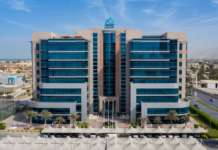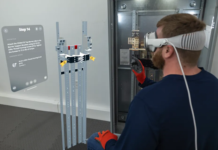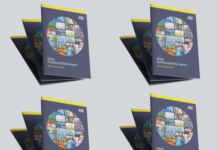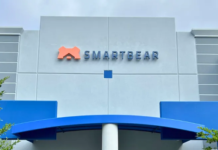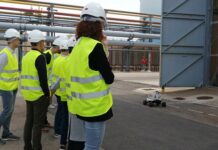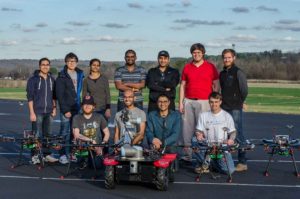
March 6, 2017 – A team of students and researchers at Virginia Tech is traveling to Abu Dhabi to continue its quest in a $5 million international competition that aims to catalyze the development of autonomous robotics.
When the call went out for participants for the Mohamed Bin Zayed International Robotics Challenge in 2015, 143 teams from around the world answered. Virginia Tech’s Team VICTOR, housed in the Wendy and Norris E. Mitchell ’58 Robotics Laboratory, is one of 25 teams remaining after two preliminary rounds of competition.
The team of undergraduate and graduate students is one of 15 to be sponsored by Khalifa University, the competition organizer. Only two other U.S.-based teams, Georgia Tech and Carnegie Mellon University, were awarded sponsorships from a $3 million fund.
The team will compete for the additional $2 million available through a series of challenges to be held in the United Arab Emirates on March 16-18.
“We’ve done very well through the two progress-report stages,” said Tomonari Furukawa, professor of mechanical engineering and advisor to Team VICTOR. “Khalifa University in Abu Dhabi has been very gracious and put together a challenge that is exciting from both a design and intellectual challenge standpoint.”
The competition will feature four separate challenges using different types of autonomous vehicles.
For the first challenge, teams must deploy a drone to locate and land on the back of a moving truck autonomously. The second challenge will use a land vehicle with an arm that must, without human intervention: traverse a distance, determine the correct wrench from several options, grasp it, and turn a valve 360 degrees. In challenge three, teams will use up to three drones to perform two tasks: identify and pick up 23 objects lying on the ground, deliver them to a specific location, and carry a bulky object — a task that the team believes will require multiple drones working in concert.
The fourth challenge will require teams to complete the first three challenges simultaneously, pushing the researchers to ensure their vehicles can effectively communicate with each other without human intervention.
The technology needed to accomplish these tasks has major implications for the future of autonomous robotics and therefore communities of the future. Such technology can help with delivery services in dynamic environments, warehouse and factory automation, and improved search-and-rescue missions, for example.
“The biggest challenge we’ve faced has been the software,” said Haseeb Chaudhry, a doctoral student in mechanical engineering and team lead in charge of the drone design and control portion of the project. “The whole challenge rides on our ability to perceive the competition area, so our visual algorithm needs to be up to the job.”
To be ready, the team has created different algorithms that work with the vehicles’ cameras to account for different conditions, such as the brighter light in the UAE, cloud cover, sand, and a variety of other variables they might encounter. For the competition, the algorithm must be able to help the vehicle distinguish targets in dynamic environments, like the moving truck in the first challenge.
That task has been one of the team’s most difficult, but they have the help of sensors that can differentiate topographical details.
“This drone is decked out in terms of sensors,” Chaudhry said. “We’ve got a high-resolution gimbal-mounted camera that we can point anywhere regardless of the orientation of the aircraft and a second fish-eye camera that provides a 180-degree field of view. The fish-eye lets us spot points of interest, which we then can point the high-resolution camera at to get a better idea if it’s a target or not.”
Team VICTOR was able to acquire the necessary equipment and travel to Abu Dhabi through sponsorships from MBZIRC competition organizer Khalifa University, Yoshimitsu Saito of NetSmile, the General Motors Foundation, and Virginia Tech.
Virginia Tech alumni and spouses Adam Rossi, a civil engineering major, and Laila Rossi, a psychology major in the College of Science, have also contributed to the team on behalf of their venture capital and private equity company, Indie. The Rossis also both earned master of business administration degrees from Virginia Tech’s Pamplin College of Business.
The team is composed of about 20 people, including graduate students from mechanical, industrial and systems, aerospace and ocean, and electrical and computer engineering, as well as three undergraduate students from industrial and systems engineering and mechanical engineering. Additionally, the team is collaborating directly with companies JENSEN HUGHES Inc. and Cowden Technologies LLC, as well as researchers from the University of Technology, Sydney, located in Australia.
“The great thing about competitions such as this, or those like the DARPA (Defense Advanced Research Projects Agency) challenges we’ve competed in in the past, is that they give scientists and researchers an even greater incentive in the realm of competition,” said Furukawa, director of the Computational Multiphysics Systems Lab in the College of Engineering. “It gives them an arena in which to push against each other to see what they can do by providing a common goal and seeing what strategies emerge to solve the same problem.”
For information visit: http://vtnews.vt.edu/



